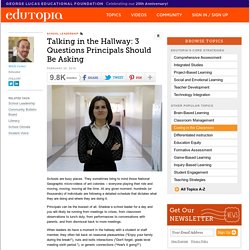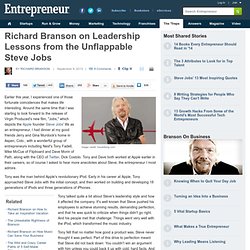

Talking in the Hallway: 3 Questions Principals Should Be Asking. Schools are busy places.

They sometimes bring to mind those National Geographic micro-videos of ant colonies -- everyone playing their role and moving, moving, moving all the time. At any given moment, hundreds (or thousands) of individuals are following a detailed schedule that dictates what they are doing and where they are doing it. Principals can be the busiest of all. Shadow a school leader for a day and you will likely be running from meetings to crises, from classroom observations to lunch duty, from performances to conversations with parents, and from dismissal back to more meetings.
When leaders do have a moment in the hallway with a student or staff member, they often fall back on seasonal pleasantries ("Enjoy your family during the break! ") Each of the above has a time and a place. Question #1: What are you reading? When a principal asks this question, whether to kids or staff, he or she is reinforcing the message that we are all readers.
#Pygmalion teacher, expectancy-effect by. ‘Students’ progress can be hindered and limited by expectation’.

How accurate is this statement in your own experience? In your own school? Or with colleagues you know elsewhere? Blog reference: “Pygmalion is a play by George Bernard Shaw, named after a Greek mythological character. It was first presented on stage to the public in 1912. I have been wanting to write this article since the day I first (and finally) met Paul Dix in June 2013. What makes an outstanding school? I did, I didn't and I do work in an outstanding school; and I don't mean Outstanding by Ofsted definition, I mean outstanding in terms of student and staff fulfilment.

Let me set my stall out from the start. This article is "not" based on Ofsted definition, so if this is why you came here, you will only be disappointed, so I suggest you are better off reading this. Many years ago I did: I was fortunate enough to be appointed to my first middle leadership position. Starting in 1999, I joined the school as the 13th teacher working for 160 students. Today, the school now thrives with approximately 150 members of staff and over 1300 students. The institution I was joining was established by a group of parents who wanted more first choice places for their children and wanted another local comprehensive school to be part of that decision process. I can safely say, my time at this school were the happiest teaching years of my career (to date); so let me tell you why.
How would you lead teaching and learning? #360Review (Part 2 of 6) What makes an outstanding senior leader? #360Review (Part 1 of 6) In my final educational composition for 2013, I am offering a reflection on my own school leadership.

What makes an outstanding senior leader? Here, I pose a series of questions for the reader and expose my very own #360Review. This is part one of a six-part leadership series to be posted over the holiday period. Richard Branson on Leadership Lessons from the Unflappable Steve Jobs. Earlier this year, I experienced one of those fortunate coincidences that makes life interesting.

Around the same time that I was starting to look forward to the release of Virgin Produced's new film, "Jobs," which depicts the Apple founder Steve Jobs' life as an entrepreneur, I had dinner at my good friends Jerry and Gina Murdock's home in Aspen, Colo., with a wonderful group of entrepreneurs including Nest's Tony Fadell, Mike McCue of Flipboard and Dave Morin of Path, along with the CEO of Twitter, Dick Costolo. Tony and Dave both worked at Apple earlier in their careers, so of course I asked to hear more anecdotes about Steve, the entrepreneur I most admire.
Tony was the man behind Apple's revolutionary iPod. Early in his career at Apple, Tony approached Steve Jobs with the initial concept, and then worked on building and developing 18 generations of iPods and three generations of iPhones. Tony talked quite a bit about Steve's leadership style and how it affected the company. Start. 6 Leadership Styles, And When You Should Use Them. Taking a team from ordinary to extraordinary means understanding and embracing the difference between management and leadership.

According to writer and consultant Peter Drucker, "Management is doing things right; leadership is doing the right things. " Manager and leader are two completely different roles, although we often use the terms interchangeably. Managers are facilitators of their team members’ success. They ensure that their people have everything they need to be productive and successful; that they’re well trained, happy and have minimal roadblocks in their path; that they’re being groomed for the next level; that they are recognized for great performance and coached through their challenges.
Conversely, a leader can be anyone on the team who has a particular talent, who is creatively thinking out of the box and has a great idea, who has experience in a certain aspect of the business or project that can prove useful to the manager and the team.